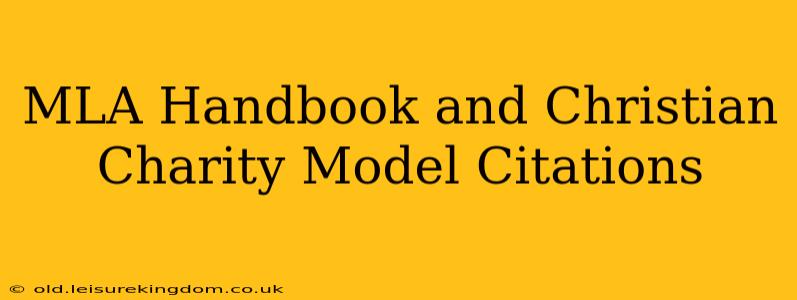The MLA Handbook provides a standardized format for citing sources, crucial for academic integrity. However, when dealing with religious texts or theological arguments, such as those related to Christian charity, additional considerations arise. This guide offers model citations for common source types within the framework of Christian charity and discusses ethical implications.
What is Christian Charity?
Before diving into citations, understanding the concept of Christian charity is vital. In Christian theology, charity (often referred to as agape) signifies selfless love, encompassing compassion, generosity, and a commitment to the well-being of others. It's not merely an emotion but a transformative principle guiding actions and beliefs. This ethical foundation influences how we approach research and scholarship involving Christian charity. Accurate and responsible citation reflects this ethical commitment.
Model Citations: MLA Handbook & Christian Charity
The following examples demonstrate how to cite various sources related to Christian charity using MLA style. Note that specific details (author, title, publication information) need to be adapted to your sources.
1. Biblical Texts
The Bible is a complex source; specifying the version is crucial.
Example:
(1 Cor. 13:1-13, New Revised Standard Version).
2. Theological Works (Books)
Example:
Hauerwas, Stanley. Character and the Christian Life. Notre Dame University Press, 1975.
3. Theological Works (Chapters in Edited Volumes)**
Example:
Smith, John. "The Practice of Agape in Modern Society." Christian Ethics in the 21st Century, edited by Mary Jones, Oxford University Press, 2020, pp. 120-145.
4. Journal Articles
Example:
Brown, Sarah. "Charity and Social Justice: A Re-evaluation of Liberation Theology." Journal of Theological Studies, vol. 72, no. 2, 2021, pp. 300-325.
5. Online Sources (Scholarly Articles)
Example:
Davis, Robert. "The Historical Development of Christian Charity." Theology Today, vol. 78, no. 1, 2022, www.theologytoday.org/article/12345.
6. Online Sources (Websites - Requires Careful Evaluation)
When citing websites, be extra cautious. Ensure the source is credible and authoritative. Avoid using unreliable or biased sources. Include the date you accessed the website.
Example:
"Christian Charity: A Definition." Theology Encyclopedia, www.theologyencyclopedia.com/charity, accessed 15 Oct. 2023.
Ethical Considerations in Citing Works on Christian Charity
- Accuracy: Ensure all information is accurate and faithfully represents the original source. Misrepresenting theological viewpoints is unethical.
- Fair Use: Use quotations responsibly and sparingly. Paraphrasing should accurately reflect the author's meaning.
- Attribution: Always properly attribute ideas, arguments, and even interpretations to their original source.
- Context: Present quotations and paraphrases within their proper context to avoid misrepresentation.
- Source Evaluation: Critically evaluate your sources. Consider the author's perspective, potential biases, and the source's reliability. For online resources, check for credibility and authority.
- Respectful Engagement: Engage respectfully with differing theological viewpoints. Avoid inflammatory language or dismissive comments.
Frequently Asked Questions (FAQs)
How do I cite a specific passage from a biblical text within an MLA citation?
You generally cite the book, chapter, and verses within parentheses, as shown in the example above. Using a specific translation (e.g., NRSV, KJV, ESV) is essential.
What if my source is a sermon or a lecture?
If possible, cite it as you would a speech: (Author's Last Name, "Title of Sermon/Lecture," Date of Delivery). If there is no readily available publication information, note that in the bibliography.
What if I am unsure about the reliability of an online source?
Consult a librarian or your instructor. If you're hesitant about using a particular online source, look for alternative, more reputable sources to support your argument.
This guide provides a framework. Always consult the latest edition of the MLA Handbook for the most up-to-date citation guidelines. Remember that accurate and ethical citation is vital for maintaining academic integrity, especially when exploring sensitive theological topics like Christian charity.

